
The Project Gutenberg EBook of Glove Lore, by Unknown This eBook is for the use of anyone anywhere in the United States and most other parts of the world at no cost and with almost no restrictions whatsoever. You may copy it, give it away or re-use it under the terms of the Project Gutenberg License included with this eBook or online at www.gutenberg.org. If you are not located in the United States, you'll have to check the laws of the country where you are located before using this ebook. Title: Glove Lore Author: Unknown Release Date: July 3, 2018 [EBook #57438] Language: English Character set encoding: UTF-8 *** START OF THIS PROJECT GUTENBERG EBOOK GLOVE LORE *** Produced by Chris Curnow, Barry Abrahamsen, and the Online Distributed Proofreading Team at http://www.pgdp.net (This file was produced from images generously made available by The Internet Archive)



In presenting our Brochure on fall and winter gloves, it occurred to us that a few facts bearing upon the historical phase of the subject would not be amiss, and, though necessarily brief, we trust may prove interesting to our readers.
Our display of gloves for the present season shows the same characteristic excellence which has always been our aim, and a range of style and variety calculated to meet the requirements of the most exacting buyer.
We feel that in point of prices there is no need to make mention, since a liberal patronage is the truest indication of our policy in this regard, and we can promise in the future the same “sterling worth” we have given in the past.
Attention is also called to our corset department, in the belief, that for the lady who has not yet worn the Fascia Corset there awaits a real revelation, the extent of which she can appreciate, only when once encircled by the graceful curves of this, The Queen of all corsets.
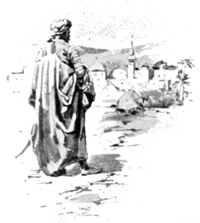
The first pair of gloves of which we have any record was the covering of skins which Jacob wore upon his hands to deceive his blind father, and it is a singular fact, that these hand-coverings, then used for deception and treachery, came in time to be a pledge of faith, a token of fidelity all over the world. The glove is unique in its universal use to symbolize good faith, from the Oriental custom of giving the purchaser a glove at the transfer of property, to its use as a love favor and a challenge.
Some authorities say that the use of gloves as a protection to the hands was known to the cave-dwellers. However this may be, it certainly was to the Romans and Greeks.
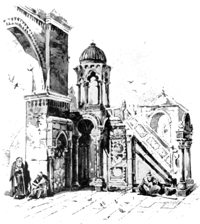
In the Norman period we find gloves worn only by men, and even then they were considered the appendages of the rich and great. They were an important factor on all ceremonial occasions, and were consequently very ornate and of rare material and workmanship, and many of them decorated with precious stones. The gloves of bishops were of silk and linen, richly embroidered, and those of monarchs were white with broad, pointed cuff. The presentation of the royal gloves at the coronation ceremony is a custom which still prevails, for in the records of Victoria’s coronation is the Duke of Norfolk’s petition to present the Queen’s coronation gloves.
While we of to-day use gloves only as a protection and an ornament, in the intervening centuries they had a significance aside from this. Churchmen wore gloves as a sign of purity; judges, as a token of the integrity of their office; men pledged their honor by their gloves; and perhaps we may be pardoned for saying that this custom still survives with us, since our gloves are sold “on honor.”
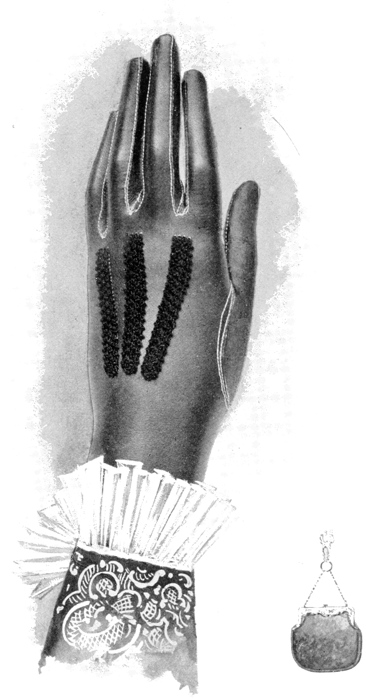
A Walking Glove.
Two-Clasp Piqué Glacé.
Two-Toned Stitching.
$1.00 to $2.00.
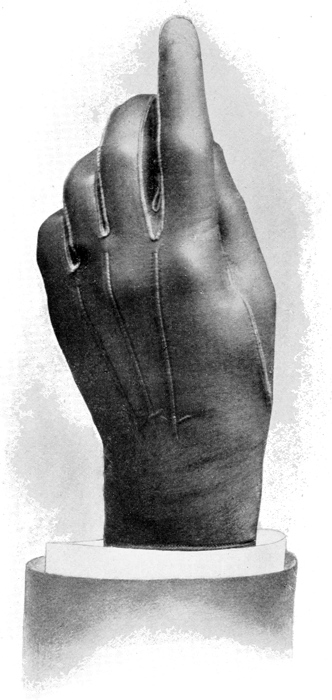
Gentleman’s Walking Glove.
English Cape Leather,
One Clasp at the Wrist,
Oak Tan and Red Shades are correct.
$1.00 to $2.25.
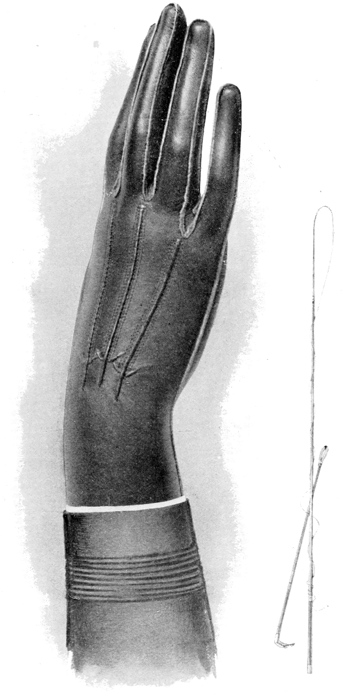
English Cape Leather Riding and Coaching Glove.
In Havana-Browns and Red Shades.
$1.00 to $2.00.
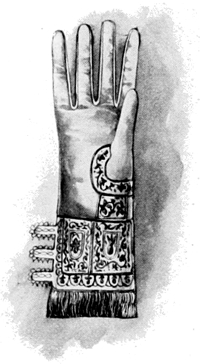
Some of the gloves worn by royal personages still exist. We illustrate a glove worn by England’s maiden queen, Elizabeth, and a very ornate affair it is—of fine white leather, profusely embroidered in gold thread, and having a yellow fringe and lined with drab silk. Elizabeth’s hands were very beautiful, we are told, the charm of which she was wont to display by the repeated removal of her gloves. DuMaurier writes how he had heard from his father “that, having been sent to her, at every audience he had with her majesty, she pulled off her gloves more than a hundred times to display her hands, which, indeed, were very beautiful and very white.” Either the royal hands were a deal larger than a lady of our time would care to possess, or they knew not in those days the grace of our perfect-fitting gloves, for those of Elizabeth’s are as much as three and one-half inches across the palm, and have a thumb five inches in length, the entire glove being about a half-yard.
We are told that gloves were not adopted by the gentler sex as a class until after the Reformation. But when once the fashion had taken hold of the feminine mind, they made up by lavish ornamentation what they had lost in time. Gloves of fine leather, with great cuffs elaborately ornamented with exquisite embroidery in rich and delicate silks, wrought with marvelous ingenuity and skill, now became a veritable mania. Lace-trimmed gloves were also worn; and a language of the glove arose, so that a secret correspondence could be carried on by certain knottings of the fringe.
Whatever may be said of the gloves of the past, they are at least picturesque and interesting, as well as varied in style.
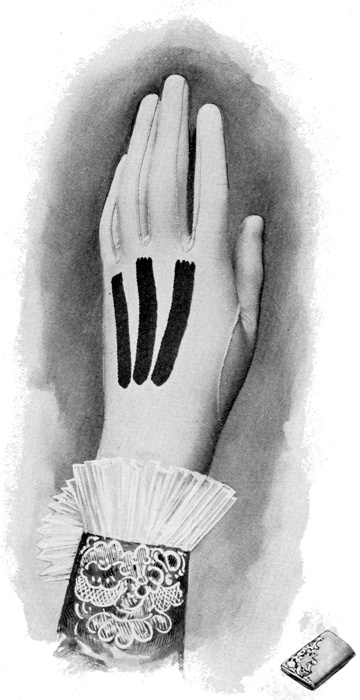
A Theatre and Reception Glove.
Four-Button, White or Cream Glacé.
Broad Stitching of Black or Self-Color.
$1.00, $1.25, $1.50, $1.75, $2.00.
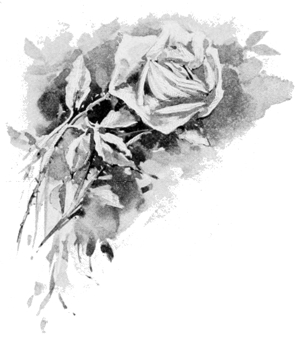
Thus did the peddler advertise his wares in the days of good Queen Bess. While perfumed gloves were used in both France and Spain prior to this time, it was the evident partiality of her dress-loving majesty that brought about a veritable perfume craze. Housewives became learned in the distillation of sweet waters, and the preparation of all manner of sweet-smelling essences. Ladies vied with each other in a lavish employment of scent. “All apparel was perfumed; hair and shoes and fans gave out sweet-smelling savor, and all kinds of jewelry contained cavities filled with strong essences. Perfumed gloves were not the least conspicuous of these toilet accessories.”
The ordinary method of perfuming the glove was to mix the substance or odor with oil, and rub it into the glove, or else to prepare a pomatum and smear it over the inner surface of the glove. Spain had now become famous for her embroidered and perfumed gloves, and thus the preference was shown for those of Spanish make, the fragrance of which was of a very enduring character.
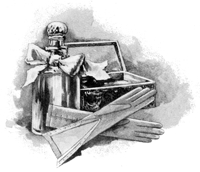
This love of luxury and ultra-refinement now reached an extreme pitch. As Shakespeare says: “The very winds were love-sick with perfume.” Into their bath the fair ladies threw musk, amber, aloes, myrrh, cedar leaves, lavender, mint, and other fragrant herbs and spices—everything was made to give forth an aromatic fragrance—an unbridled luxury that bid fair to outdo the fair dames of Rome.
The use of perfumed gloves has never wholly died out. In France, and even in America, Russia leather gloves are worn to this day, for the sake of their aromatic quality.
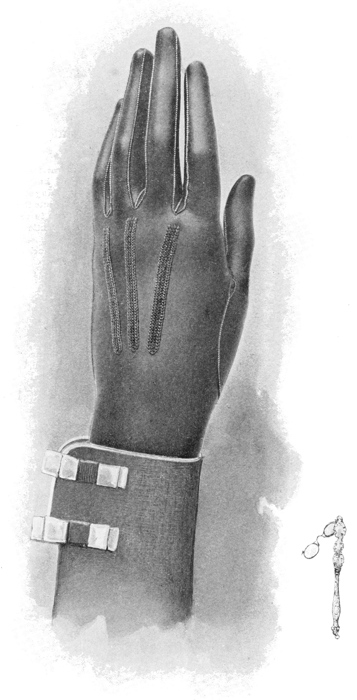
A Semi-Dress Glove.
Two-Clasp or Four-Button.
Suéde or Glacé Kid.
$1.00 to $2.00.
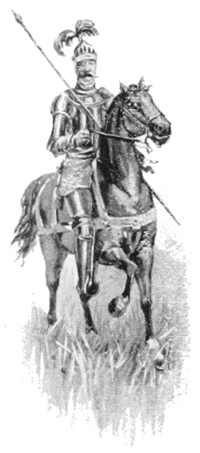
The use of the glove as a challenge, carries us back to the chivalrous days of the armoured knights and ladies fair: the blare of trumpets, the neighing of steeds, the ring of steel as the gauntlet is flung into the lists, and the hush as it is taken up; the lance in rest, the clash of conflict—all, happily, but the romantic picture of the past.
The use of the glove as a gage is very ancient, and it involved the very highest point of honor.
Besides its use in the courts of chivalry, the glove was used in appeals of felony, and in civil disputes as to property. If a man accused of crime took his accuser’s glove on the point of his sword, and in the ensuing combat came out victorious, it was considered sufficient proof of his innocence. The same was true as to disputed ownership of land.
When the sovereign of England was crowned, it was customary for a knight to appear as champion, casting down the gauntlet, and challenging to mortal combat any who dared gainsay the monarch’s right. This ceremony was in use for the last time at the coronation of George IV.
When two knights rode together in combat, it would often happen that one wore in his helmet a dainty glove, a glove far different indeed from the steel one he had so recently taken up, the favor of some fair lady of his love, who was perhaps looking down upon him then. Thus he was for a second time bound to quit himself valiantly by the same token of a glove; a slight thing enough, but one which has ever been bound up with ideas of honor and deeds of knightly valor.
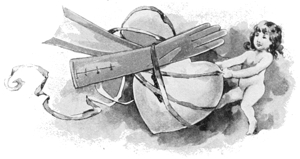
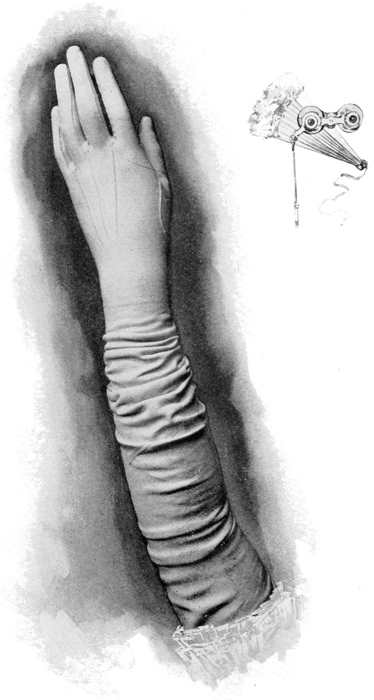
A Full-Dress Glove.
$1.50 to $4.00.
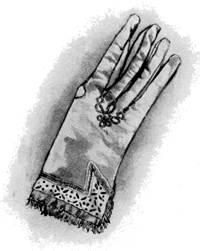
Among others of the gloves that remain from those old days, is a well-worn pair made of substantial leather, stitched with red and gold, and with a border pinked in the wrist. Very unpretentious, indeed, beside the hand-coverings of kings and queens and gilded nobles; yet their very wrinkles mean more to the world than the whole of that gaudy lot; for if tradition does not misinform us, these gloves were worn by England’s greatest son, Shakespeare. What a world of meaning that phrase attaches to these bits of leather, still bearing the imprint of the hand that penned the masterpieces of our literature.
We are reminded that the bard’s father was a glover by trade, and we of to-day certainly have cause to rejoice that the son was not enamored of his father’s following, for who knows but that the hand that startled the world by its touch might only have plied a modest craft.
Whatever may have been the shortcomings of the gloves of those days, certain it is there could be no complaint as to variety. Old records speak of “single gloves and gloves lin’d, top’d, lac’d, fringed with gold, silver, silk, and fur, and gloves of velvet, satin, and taffety.”
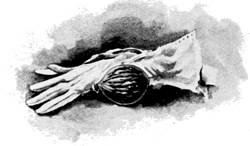
The practice of wearing gloves at night to impart delicacy to the skin was common, in the seventeenth century, to gentlemen as well as ladies. To even greater lengths did the fairer sex go towards beautifying their complexion. It was not uncommon to wear gloves lined with unguents, or to cover the face with a mask plastered inside with a perfumed pomade. Some steeped slices of raw veal in milk and laid them on the face. “Young and tender beauties bathed in milk; beauties who were no longer young, and far from tender, bathed in wine or the like.” Gloves of chicken skin were thought to have peculiar virtue, and were worn at night to make the hands soft and white. They were so fine in texture that they could be packed in a nut-shell, and were prized by cavaliers as dainty gifts for their lady-loves.
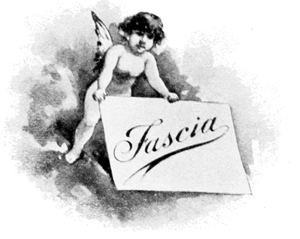
When we introduced the Fascia Corset to the ladies of Buffalo, some three years since, it was in direct competition with all the most widely known makes. We were confident that the Fascia was superior to any of these, and that an article of such unqualified merit must eventually win the place it so markedly deserved.
The constant increase in the demand for Fascia Corsets shows conclusively in what regard they are now held by the ladies of Buffalo.
The Fascia is a Parisian-made corset, molded upon the forms of living models; thus, in the graceful flow of its lines, it reflects nature’s own handiwork. It is made up in French Coutille, French Zanilla, and Figured Italian Cloth, making a durable as well as a beautiful corset. The whole corset is carefully and thoroughly made, and only the very finest quality of Greenland Whalebone is used in its manufacture.
In short, it is the crowning masterpiece of the corset-maker’s art. Attention is called to the accompanying illustrations, which suggest some of our latest models.
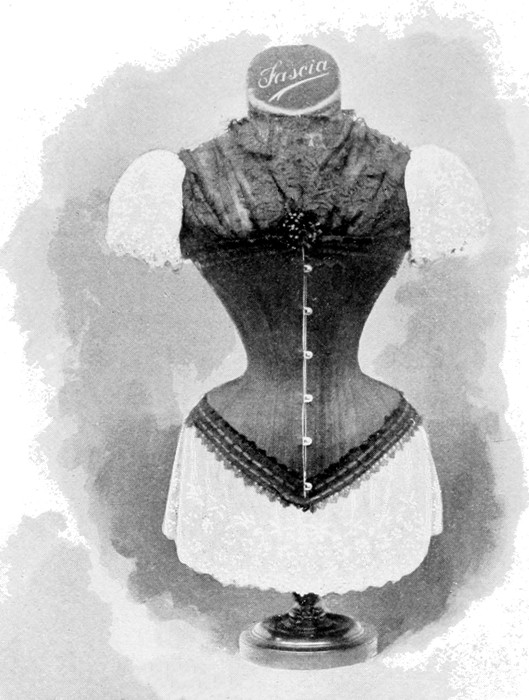
Black $3.00 Fascia.
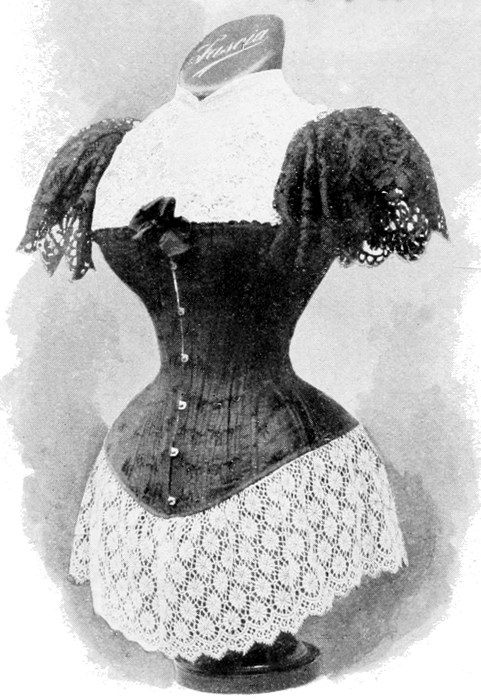
White $10.00 Fascia.
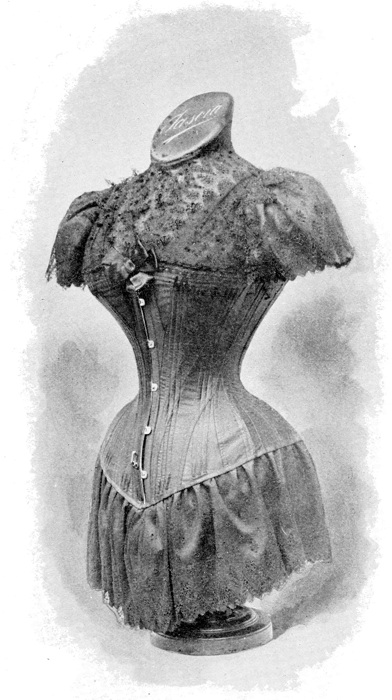
White Fascia, $7.50.
Black Fascia, $8.00.
End of the Project Gutenberg EBook of Glove Lore, by Unknown
*** END OF THIS PROJECT GUTENBERG EBOOK GLOVE LORE ***
***** This file should be named 57438-h.htm or 57438-h.zip *****
This and all associated files of various formats will be found in:
http://www.gutenberg.org/5/7/4/3/57438/
Produced by Chris Curnow, Barry Abrahamsen, and the Online
Distributed Proofreading Team at http://www.pgdp.net (This
file was produced from images generously made available
by The Internet Archive)
Updated editions will replace the previous one--the old editions will
be renamed.
Creating the works from print editions not protected by U.S. copyright
law means that no one owns a United States copyright in these works,
so the Foundation (and you!) can copy and distribute it in the United
States without permission and without paying copyright
royalties. Special rules, set forth in the General Terms of Use part
of this license, apply to copying and distributing Project
Gutenberg-tm electronic works to protect the PROJECT GUTENBERG-tm
concept and trademark. Project Gutenberg is a registered trademark,
and may not be used if you charge for the eBooks, unless you receive
specific permission. If you do not charge anything for copies of this
eBook, complying with the rules is very easy. You may use this eBook
for nearly any purpose such as creation of derivative works, reports,
performances and research. They may be modified and printed and given
away--you may do practically ANYTHING in the United States with eBooks
not protected by U.S. copyright law. Redistribution is subject to the
trademark license, especially commercial redistribution.
START: FULL LICENSE
THE FULL PROJECT GUTENBERG LICENSE
PLEASE READ THIS BEFORE YOU DISTRIBUTE OR USE THIS WORK
To protect the Project Gutenberg-tm mission of promoting the free
distribution of electronic works, by using or distributing this work
(or any other work associated in any way with the phrase "Project
Gutenberg"), you agree to comply with all the terms of the Full
Project Gutenberg-tm License available with this file or online at
www.gutenberg.org/license.
Section 1. General Terms of Use and Redistributing Project
Gutenberg-tm electronic works
1.A. By reading or using any part of this Project Gutenberg-tm
electronic work, you indicate that you have read, understand, agree to
and accept all the terms of this license and intellectual property
(trademark/copyright) agreement. If you do not agree to abide by all
the terms of this agreement, you must cease using and return or
destroy all copies of Project Gutenberg-tm electronic works in your
possession. If you paid a fee for obtaining a copy of or access to a
Project Gutenberg-tm electronic work and you do not agree to be bound
by the terms of this agreement, you may obtain a refund from the
person or entity to whom you paid the fee as set forth in paragraph
1.E.8.
1.B. "Project Gutenberg" is a registered trademark. It may only be
used on or associated in any way with an electronic work by people who
agree to be bound by the terms of this agreement. There are a few
things that you can do with most Project Gutenberg-tm electronic works
even without complying with the full terms of this agreement. See
paragraph 1.C below. There are a lot of things you can do with Project
Gutenberg-tm electronic works if you follow the terms of this
agreement and help preserve free future access to Project Gutenberg-tm
electronic works. See paragraph 1.E below.
1.C. The Project Gutenberg Literary Archive Foundation ("the
Foundation" or PGLAF), owns a compilation copyright in the collection
of Project Gutenberg-tm electronic works. Nearly all the individual
works in the collection are in the public domain in the United
States. If an individual work is unprotected by copyright law in the
United States and you are located in the United States, we do not
claim a right to prevent you from copying, distributing, performing,
displaying or creating derivative works based on the work as long as
all references to Project Gutenberg are removed. Of course, we hope
that you will support the Project Gutenberg-tm mission of promoting
free access to electronic works by freely sharing Project Gutenberg-tm
works in compliance with the terms of this agreement for keeping the
Project Gutenberg-tm name associated with the work. You can easily
comply with the terms of this agreement by keeping this work in the
same format with its attached full Project Gutenberg-tm License when
you share it without charge with others.
1.D. The copyright laws of the place where you are located also govern
what you can do with this work. Copyright laws in most countries are
in a constant state of change. If you are outside the United States,
check the laws of your country in addition to the terms of this
agreement before downloading, copying, displaying, performing,
distributing or creating derivative works based on this work or any
other Project Gutenberg-tm work. The Foundation makes no
representations concerning the copyright status of any work in any
country outside the United States.
1.E. Unless you have removed all references to Project Gutenberg:
1.E.1. The following sentence, with active links to, or other
immediate access to, the full Project Gutenberg-tm License must appear
prominently whenever any copy of a Project Gutenberg-tm work (any work
on which the phrase "Project Gutenberg" appears, or with which the
phrase "Project Gutenberg" is associated) is accessed, displayed,
performed, viewed, copied or distributed:
This eBook is for the use of anyone anywhere in the United States and
most other parts of the world at no cost and with almost no
restrictions whatsoever. You may copy it, give it away or re-use it
under the terms of the Project Gutenberg License included with this
eBook or online at www.gutenberg.org. If you are not located in the
United States, you'll have to check the laws of the country where you
are located before using this ebook.
1.E.2. If an individual Project Gutenberg-tm electronic work is
derived from texts not protected by U.S. copyright law (does not
contain a notice indicating that it is posted with permission of the
copyright holder), the work can be copied and distributed to anyone in
the United States without paying any fees or charges. If you are
redistributing or providing access to a work with the phrase "Project
Gutenberg" associated with or appearing on the work, you must comply
either with the requirements of paragraphs 1.E.1 through 1.E.7 or
obtain permission for the use of the work and the Project Gutenberg-tm
trademark as set forth in paragraphs 1.E.8 or 1.E.9.
1.E.3. If an individual Project Gutenberg-tm electronic work is posted
with the permission of the copyright holder, your use and distribution
must comply with both paragraphs 1.E.1 through 1.E.7 and any
additional terms imposed by the copyright holder. Additional terms
will be linked to the Project Gutenberg-tm License for all works
posted with the permission of the copyright holder found at the
beginning of this work.
1.E.4. Do not unlink or detach or remove the full Project Gutenberg-tm
License terms from this work, or any files containing a part of this
work or any other work associated with Project Gutenberg-tm.
1.E.5. Do not copy, display, perform, distribute or redistribute this
electronic work, or any part of this electronic work, without
prominently displaying the sentence set forth in paragraph 1.E.1 with
active links or immediate access to the full terms of the Project
Gutenberg-tm License.
1.E.6. You may convert to and distribute this work in any binary,
compressed, marked up, nonproprietary or proprietary form, including
any word processing or hypertext form. However, if you provide access
to or distribute copies of a Project Gutenberg-tm work in a format
other than "Plain Vanilla ASCII" or other format used in the official
version posted on the official Project Gutenberg-tm web site
(www.gutenberg.org), you must, at no additional cost, fee or expense
to the user, provide a copy, a means of exporting a copy, or a means
of obtaining a copy upon request, of the work in its original "Plain
Vanilla ASCII" or other form. Any alternate format must include the
full Project Gutenberg-tm License as specified in paragraph 1.E.1.
1.E.7. Do not charge a fee for access to, viewing, displaying,
performing, copying or distributing any Project Gutenberg-tm works
unless you comply with paragraph 1.E.8 or 1.E.9.
1.E.8. You may charge a reasonable fee for copies of or providing
access to or distributing Project Gutenberg-tm electronic works
provided that
* You pay a royalty fee of 20% of the gross profits you derive from
the use of Project Gutenberg-tm works calculated using the method
you already use to calculate your applicable taxes. The fee is owed
to the owner of the Project Gutenberg-tm trademark, but he has
agreed to donate royalties under this paragraph to the Project
Gutenberg Literary Archive Foundation. Royalty payments must be paid
within 60 days following each date on which you prepare (or are
legally required to prepare) your periodic tax returns. Royalty
payments should be clearly marked as such and sent to the Project
Gutenberg Literary Archive Foundation at the address specified in
Section 4, "Information about donations to the Project Gutenberg
Literary Archive Foundation."
* You provide a full refund of any money paid by a user who notifies
you in writing (or by e-mail) within 30 days of receipt that s/he
does not agree to the terms of the full Project Gutenberg-tm
License. You must require such a user to return or destroy all
copies of the works possessed in a physical medium and discontinue
all use of and all access to other copies of Project Gutenberg-tm
works.
* You provide, in accordance with paragraph 1.F.3, a full refund of
any money paid for a work or a replacement copy, if a defect in the
electronic work is discovered and reported to you within 90 days of
receipt of the work.
* You comply with all other terms of this agreement for free
distribution of Project Gutenberg-tm works.
1.E.9. If you wish to charge a fee or distribute a Project
Gutenberg-tm electronic work or group of works on different terms than
are set forth in this agreement, you must obtain permission in writing
from both the Project Gutenberg Literary Archive Foundation and The
Project Gutenberg Trademark LLC, the owner of the Project Gutenberg-tm
trademark. Contact the Foundation as set forth in Section 3 below.
1.F.
1.F.1. Project Gutenberg volunteers and employees expend considerable
effort to identify, do copyright research on, transcribe and proofread
works not protected by U.S. copyright law in creating the Project
Gutenberg-tm collection. Despite these efforts, Project Gutenberg-tm
electronic works, and the medium on which they may be stored, may
contain "Defects," such as, but not limited to, incomplete, inaccurate
or corrupt data, transcription errors, a copyright or other
intellectual property infringement, a defective or damaged disk or
other medium, a computer virus, or computer codes that damage or
cannot be read by your equipment.
1.F.2. LIMITED WARRANTY, DISCLAIMER OF DAMAGES - Except for the "Right
of Replacement or Refund" described in paragraph 1.F.3, the Project
Gutenberg Literary Archive Foundation, the owner of the Project
Gutenberg-tm trademark, and any other party distributing a Project
Gutenberg-tm electronic work under this agreement, disclaim all
liability to you for damages, costs and expenses, including legal
fees. YOU AGREE THAT YOU HAVE NO REMEDIES FOR NEGLIGENCE, STRICT
LIABILITY, BREACH OF WARRANTY OR BREACH OF CONTRACT EXCEPT THOSE
PROVIDED IN PARAGRAPH 1.F.3. YOU AGREE THAT THE FOUNDATION, THE
TRADEMARK OWNER, AND ANY DISTRIBUTOR UNDER THIS AGREEMENT WILL NOT BE
LIABLE TO YOU FOR ACTUAL, DIRECT, INDIRECT, CONSEQUENTIAL, PUNITIVE OR
INCIDENTAL DAMAGES EVEN IF YOU GIVE NOTICE OF THE POSSIBILITY OF SUCH
DAMAGE.
1.F.3. LIMITED RIGHT OF REPLACEMENT OR REFUND - If you discover a
defect in this electronic work within 90 days of receiving it, you can
receive a refund of the money (if any) you paid for it by sending a
written explanation to the person you received the work from. If you
received the work on a physical medium, you must return the medium
with your written explanation. The person or entity that provided you
with the defective work may elect to provide a replacement copy in
lieu of a refund. If you received the work electronically, the person
or entity providing it to you may choose to give you a second
opportunity to receive the work electronically in lieu of a refund. If
the second copy is also defective, you may demand a refund in writing
without further opportunities to fix the problem.
1.F.4. Except for the limited right of replacement or refund set forth
in paragraph 1.F.3, this work is provided to you 'AS-IS', WITH NO
OTHER WARRANTIES OF ANY KIND, EXPRESS OR IMPLIED, INCLUDING BUT NOT
LIMITED TO WARRANTIES OF MERCHANTABILITY OR FITNESS FOR ANY PURPOSE.
1.F.5. Some states do not allow disclaimers of certain implied
warranties or the exclusion or limitation of certain types of
damages. If any disclaimer or limitation set forth in this agreement
violates the law of the state applicable to this agreement, the
agreement shall be interpreted to make the maximum disclaimer or
limitation permitted by the applicable state law. The invalidity or
unenforceability of any provision of this agreement shall not void the
remaining provisions.
1.F.6. INDEMNITY - You agree to indemnify and hold the Foundation, the
trademark owner, any agent or employee of the Foundation, anyone
providing copies of Project Gutenberg-tm electronic works in
accordance with this agreement, and any volunteers associated with the
production, promotion and distribution of Project Gutenberg-tm
electronic works, harmless from all liability, costs and expenses,
including legal fees, that arise directly or indirectly from any of
the following which you do or cause to occur: (a) distribution of this
or any Project Gutenberg-tm work, (b) alteration, modification, or
additions or deletions to any Project Gutenberg-tm work, and (c) any
Defect you cause.
Section 2. Information about the Mission of Project Gutenberg-tm
Project Gutenberg-tm is synonymous with the free distribution of
electronic works in formats readable by the widest variety of
computers including obsolete, old, middle-aged and new computers. It
exists because of the efforts of hundreds of volunteers and donations
from people in all walks of life.
Volunteers and financial support to provide volunteers with the
assistance they need are critical to reaching Project Gutenberg-tm's
goals and ensuring that the Project Gutenberg-tm collection will
remain freely available for generations to come. In 2001, the Project
Gutenberg Literary Archive Foundation was created to provide a secure
and permanent future for Project Gutenberg-tm and future
generations. To learn more about the Project Gutenberg Literary
Archive Foundation and how your efforts and donations can help, see
Sections 3 and 4 and the Foundation information page at
www.gutenberg.org
Section 3. Information about the Project Gutenberg Literary Archive Foundation
The Project Gutenberg Literary Archive Foundation is a non profit
501(c)(3) educational corporation organized under the laws of the
state of Mississippi and granted tax exempt status by the Internal
Revenue Service. The Foundation's EIN or federal tax identification
number is 64-6221541. Contributions to the Project Gutenberg Literary
Archive Foundation are tax deductible to the full extent permitted by
U.S. federal laws and your state's laws.
The Foundation's principal office is in Fairbanks, Alaska, with the
mailing address: PO Box 750175, Fairbanks, AK 99775, but its
volunteers and employees are scattered throughout numerous
locations. Its business office is located at 809 North 1500 West, Salt
Lake City, UT 84116, (801) 596-1887. Email contact links and up to
date contact information can be found at the Foundation's web site and
official page at www.gutenberg.org/contact
For additional contact information:
Dr. Gregory B. Newby
Chief Executive and Director
gbnewby@pglaf.org
Section 4. Information about Donations to the Project Gutenberg
Literary Archive Foundation
Project Gutenberg-tm depends upon and cannot survive without wide
spread public support and donations to carry out its mission of
increasing the number of public domain and licensed works that can be
freely distributed in machine readable form accessible by the widest
array of equipment including outdated equipment. Many small donations
($1 to $5,000) are particularly important to maintaining tax exempt
status with the IRS.
The Foundation is committed to complying with the laws regulating
charities and charitable donations in all 50 states of the United
States. Compliance requirements are not uniform and it takes a
considerable effort, much paperwork and many fees to meet and keep up
with these requirements. We do not solicit donations in locations
where we have not received written confirmation of compliance. To SEND
DONATIONS or determine the status of compliance for any particular
state visit www.gutenberg.org/donate
While we cannot and do not solicit contributions from states where we
have not met the solicitation requirements, we know of no prohibition
against accepting unsolicited donations from donors in such states who
approach us with offers to donate.
International donations are gratefully accepted, but we cannot make
any statements concerning tax treatment of donations received from
outside the United States. U.S. laws alone swamp our small staff.
Please check the Project Gutenberg Web pages for current donation
methods and addresses. Donations are accepted in a number of other
ways including checks, online payments and credit card donations. To
donate, please visit: www.gutenberg.org/donate
Section 5. General Information About Project Gutenberg-tm electronic works.
Professor Michael S. Hart was the originator of the Project
Gutenberg-tm concept of a library of electronic works that could be
freely shared with anyone. For forty years, he produced and
distributed Project Gutenberg-tm eBooks with only a loose network of
volunteer support.
Project Gutenberg-tm eBooks are often created from several printed
editions, all of which are confirmed as not protected by copyright in
the U.S. unless a copyright notice is included. Thus, we do not
necessarily keep eBooks in compliance with any particular paper
edition.
Most people start at our Web site which has the main PG search
facility: www.gutenberg.org
This Web site includes information about Project Gutenberg-tm,
including how to make donations to the Project Gutenberg Literary
Archive Foundation, how to help produce our new eBooks, and how to
subscribe to our email newsletter to hear about new eBooks.